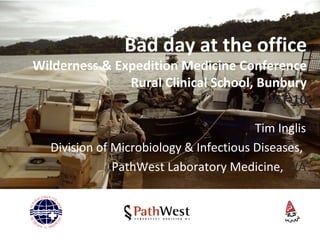Bad day
- 1. Bad day at the office Wilderness & Expedition Medicine Conference Rural Clinical School, Bunbury 2-OCT-10 Tim Inglis Division of Microbiology & Infectious Diseases, PathWest Laboratory Medicine, WA
- 2. Outline ŌĆóPerak, Malaysia 2008 ŌĆóExpedition psychology ŌĆóWhat is expedition stress? ŌĆóWho gets it? ŌĆóWhat can be done about it? ŌĆóCan it be prevented?
- 3. Perak, 2008
- 5. Expedition psychology ’éŁ group travel with a purpose ’éŁ wilderness = outside comfort zone ’éŁ independent of external resources ’éŁ little redundancy ’éŁ ragbag assortment, individuals, egotists ’éŁ group aims > personal objectives ’éŁ expedition paradox: ’éŁ The need to maximise opportunity for individual expertise in order to achieve group objective
- 6. Expedition stress ŌĆó Irritability, blame-shifting, abdication ŌĆó Uncharacteristic behaviour ŌĆó Anxiety ŌĆó Loss of motivation, appetite, energy ŌĆó Inability to sleep when tired ŌĆó Depression ŌĆó Threat of or attempts at deliberate self harm ’éŁ NB malaria, other tropical infections, heat exhaustion can present with some of the above
- 7. Epidemiology? When - timeline 1 Preparation 2 Outward travel 3 Expedition 4 Return travel 5 Aftermath Who: ŌĆó Prior psychological history ŌĆó Vulnerable individuals: ŌĆōfirst timers ŌĆōoverconfident ŌĆōinflexible ŌĆōintolerant ŌĆōpoorly prepared ŌĆōsubstance dependent ŌĆó Stress overloaded ŌĆó Expedition leaders
- 8. Countermeasures ŌĆó identify vulnerable people, key stressors, triggers ŌĆó early recognition ŌĆó stress-easing, relieving & abating activities ŌĆō Task sharing ŌĆō Communication ŌĆō Rest & recreation ŌĆó Avoid superficial, quick & easy solutions
- 10. Thanks to ŌĆó Dr Abdul Russ Karim Hassan ŌĆó Prof Savithri Puthucheary ŌĆó Dr Richard Bradbury ŌĆó Prof Vasanthi Thesanevam










